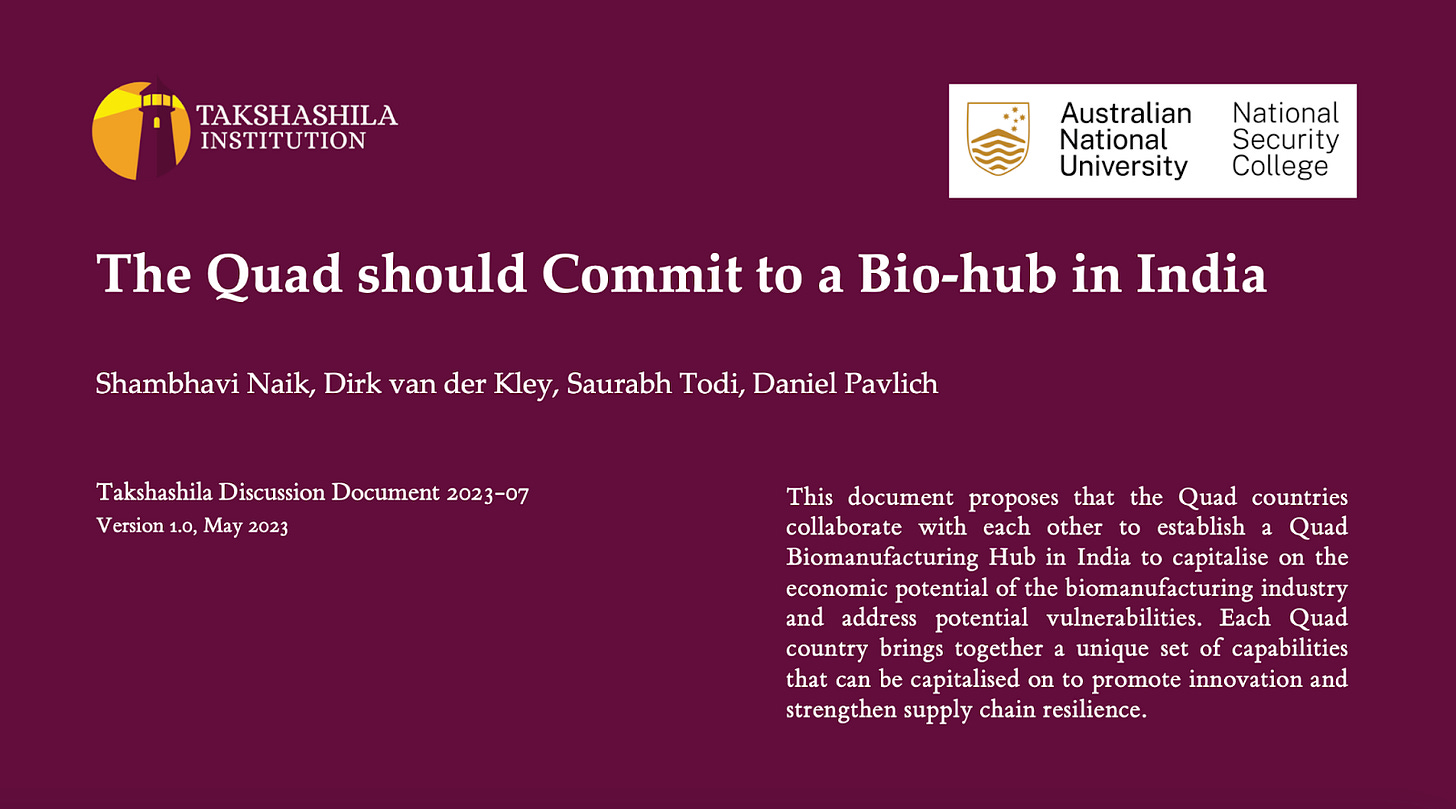India’s New Space Policy
Dear Reader,
Welcome to Takshashila Dispatch. In this edition, we cover our work from the past week on a Quad-led bio-manufacturing hub in India, the recent failed attempt at labour reforms by Tamil Nadu, structural reforms at the United Nations, and India’s options during a China-Taiwan crisis.
We have recently instituted the Network for Advanced Study of China (NASC) Fellowship. For information on how to apply, click here.
Event | India’s New Space Policy
Can India’s newly unveiled Space Policy live up to its promise of transforming the industry, fostering innovation & creating jobs?
Join us for an online discussion on the policy’s potential & limitations for India’s space sector.
A Pathway to Quad Bio-Hub in India
In the discussion document prepared jointly by the Takshashila Institution and the National Security College at Australian National University, the authors Shambhavi Naik, Dirk van der Kley, Saurabh Todi, and Daniel Pavlich argue that the Quad countries establish a bio-manufacturing hub in India.
Beyond the obvious economic value, there is significant strategic and social value in modern biotechnologies. Modern biotechnology products are or will be essential for producing food, energy, and health management.
Numerous potential military applications for biotechnology range from food security to new, lightweight polymers, to understanding the potential of highly effective biological weapons (which are banned under international law).
Tamil Nadu’s U-turn on Labour Law Reforms
Tamil Nadu recently announced changes to its labour laws to allow flexible work hours for factory workers, only to reverse the decision later.
In an opinion for Money Control, Anupam Manur argues that flexibility in working hours would have been useful for workers, factories and jobseekers:
“Unfortunately, much of the discourse on labour regulation is often framed as a zero-sum game – business versus labour – and that only one can win at the expense of the other. However, these need not be antagonistic. Labour reforms help draw in larger investments, which leads to higher employment, productivity, and wages. Further, evidence shows that as countries develop, the average working hours reduce over time.
Flexible working hours help industries run back-to-back shifts and increase capacity utilisation. However, this is only the first minor step in reforming labour laws. There are multiple other areas that require reforms: From severe regulations such as the hiring and firing constraints, which requires state approval before firing employees, to more bizarre rules requiring factories to mandatorily provide spittoons in convenient locations for employees.
Structural Reforms at the U.N.
Has the U.N. lost its relevance in recent decades? In his column for the Mint, Nitin Pai writes that U.N. must look inwards in search of answers:
Unfortunately, it is highly likely that the UN will fail in these areas even if world leaders approve of the agenda. That’s because none of them addresses the underlying reason for the UN’s growing irrelevance: its political structure. It resolutely reflects the balance of power of the Industrial Age of 1945, even as that power has not only massively shifted in the past three decades, but human civilization itself has entered the Information Age. Power, interest, authority, responsibility and accountability are extremely mismatched, and until this is fixed, the UN cannot reverse its course of increasing ineffectiveness.
But, as Gowan notes, “Many UN-based diplomats have, however, already concluded that (Security Council reform)... is infeasible." This is not surprising. Large complex organizations seldom show an appetite for the bold changes necessary even when their survival is at stake. They tend to add more bureaucracy, more complexity, and look for flashy new things to do so that they appear trendy.
India’s Options During China-Taiwan Crisis
In last Wednesday’s All Things Policy, Anushka Saxena spoke to Ambassador Vijay Gokhale about the geopolitics of China-Taiwan relations, and what implications a crisis or conflict scenario between China and the US/ Taiwan will have for India.
Read our past work on this subject here and here.
Enrol for Takshashila’s PGP Programme
The Post-Graduate Programme in Public Policy (PGP Programme) is a 48-week multi-disciplinary, specialised programme, designed for students who wish to gain a deeper understanding of the theoretical and empirical approaches to public policy.
The PGP Programme is suitable for working professionals in the public policy space or looking to explore a career in public policy while pursuing current occupations. Prior work experience of 2 years is a desirable criterion for admission. The PGP programme will equip students with the necessary skills of policymaking, analysis, persuasion, and communication in their desired career choice.
The last date for applications is May 28, 2023!
That’s all from us this week. Take care!






